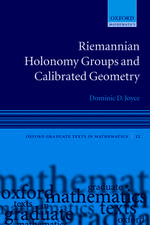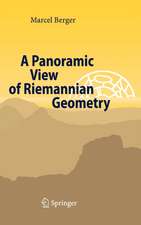Finite Möbius Groups, Minimal Immersions of Spheres, and Moduli: Universitext
Autor Gabor Tothen Limba Engleză Hardback – 16 noi 2001
| Toate formatele și edițiile | Preț | Express |
|---|---|---|
| Paperback (1) | 642.51 lei 43-57 zile | |
| Springer – 8 sep 2012 | 642.51 lei 43-57 zile | |
| Hardback (1) | 647.59 lei 43-57 zile | |
| Springer – 16 noi 2001 | 647.59 lei 43-57 zile |
Din seria Universitext
- 13%
 Preț: 353.49 lei
Preț: 353.49 lei -
 Preț: 487.96 lei
Preț: 487.96 lei - 15%
 Preț: 543.75 lei
Preț: 543.75 lei -
 Preț: 418.67 lei
Preț: 418.67 lei - 20%
 Preț: 628.22 lei
Preț: 628.22 lei -
 Preț: 322.62 lei
Preț: 322.62 lei - 17%
 Preț: 364.82 lei
Preț: 364.82 lei -
 Preț: 634.38 lei
Preț: 634.38 lei - 17%
 Preț: 427.32 lei
Preț: 427.32 lei - 13%
 Preț: 355.52 lei
Preț: 355.52 lei - 17%
 Preț: 431.50 lei
Preț: 431.50 lei - 19%
 Preț: 429.21 lei
Preț: 429.21 lei - 19%
 Preț: 393.95 lei
Preț: 393.95 lei -
 Preț: 360.08 lei
Preț: 360.08 lei -
 Preț: 358.44 lei
Preț: 358.44 lei - 13%
 Preț: 389.95 lei
Preț: 389.95 lei -
 Preț: 465.61 lei
Preț: 465.61 lei -
 Preț: 371.99 lei
Preț: 371.99 lei - 15%
 Preț: 497.22 lei
Preț: 497.22 lei - 15%
 Preț: 737.46 lei
Preț: 737.46 lei - 17%
 Preț: 394.41 lei
Preț: 394.41 lei - 15%
 Preț: 509.58 lei
Preț: 509.58 lei - 17%
 Preț: 427.68 lei
Preț: 427.68 lei - 8%
 Preț: 495.44 lei
Preț: 495.44 lei - 17%
 Preț: 364.57 lei
Preț: 364.57 lei - 17%
 Preț: 369.08 lei
Preț: 369.08 lei -
 Preț: 396.55 lei
Preț: 396.55 lei - 15%
 Preț: 553.33 lei
Preț: 553.33 lei - 17%
 Preț: 365.35 lei
Preț: 365.35 lei -
 Preț: 356.78 lei
Preț: 356.78 lei -
 Preț: 673.45 lei
Preț: 673.45 lei - 17%
 Preț: 426.76 lei
Preț: 426.76 lei - 20%
 Preț: 569.56 lei
Preț: 569.56 lei -
 Preț: 372.87 lei
Preț: 372.87 lei -
 Preț: 319.07 lei
Preț: 319.07 lei -
 Preț: 379.86 lei
Preț: 379.86 lei -
 Preț: 445.88 lei
Preț: 445.88 lei -
 Preț: 382.36 lei
Preț: 382.36 lei - 15%
 Preț: 533.72 lei
Preț: 533.72 lei - 15%
 Preț: 496.02 lei
Preț: 496.02 lei - 15%
 Preț: 474.82 lei
Preț: 474.82 lei -
 Preț: 389.70 lei
Preț: 389.70 lei -
 Preț: 484.08 lei
Preț: 484.08 lei - 15%
 Preț: 643.48 lei
Preț: 643.48 lei -
 Preț: 415.02 lei
Preț: 415.02 lei - 15%
 Preț: 602.25 lei
Preț: 602.25 lei - 20%
 Preț: 510.24 lei
Preț: 510.24 lei - 15%
 Preț: 588.37 lei
Preț: 588.37 lei -
 Preț: 381.59 lei
Preț: 381.59 lei
Preț: 647.59 lei
Preț vechi: 761.87 lei
-15% Nou
Puncte Express: 971
Preț estimativ în valută:
123.96€ • 134.69$ • 104.19£
123.96€ • 134.69$ • 104.19£
Carte tipărită la comandă
Livrare economică 21 aprilie-05 mai
Preluare comenzi: 021 569.72.76
Specificații
ISBN-13: 9780387953236
ISBN-10: 038795323X
Pagini: 319
Ilustrații: XVI, 319 p.
Dimensiuni: 155 x 235 x 21 mm
Greutate: 0.62 kg
Ediția:2002
Editura: Springer
Colecția Springer
Seria Universitext
Locul publicării:New York, NY, United States
ISBN-10: 038795323X
Pagini: 319
Ilustrații: XVI, 319 p.
Dimensiuni: 155 x 235 x 21 mm
Greutate: 0.62 kg
Ediția:2002
Editura: Springer
Colecția Springer
Seria Universitext
Locul publicării:New York, NY, United States
Public țintă
ResearchCuprins
1 Finite Mobius Groups.- 1.1 Platonic Solids and Finite Rotation Groups.- 1.2 Rotations and Möbius Transformations.- 1.3 Invariant Forms.- 1.4 Minimal Immersions of the 3-sphere into Spheres.- 1.5 Minimal Imbeddings of Spherical Space Forms into Spheres.- 1.6 Additional Topic: Klein’s Theory of the Icosahedron.- 2 Moduli for Eigenmaps.- 2.1 Spherical Harmonics.- 2.2 Generalities on Eigenmaps.- 2.3 Moduli.- 2.4 Raising and Lowering the Degree.- 2.5 Exact Dimension of the Moduli ?p.- 2.6 Equivariant Imbedding of Moduli.- 2.7 Quadratic Eigenmaps in Domain Dimension Three.- 2.8 Raising the Domain Dimension.- 2.9 Additional Topic: Quadratic Eigenmaps.- 3 Moduli for Spherical Minimal Immersions.- 3.1 Conformal Eigenmaps and Moduli.- 3.2 Conformal Fields and Eigenmaps.- 3.3 Conformal Fields and Raising and Lowering the Degree.- 3.4 Exact Dimension of the Moduli ?p.- 3.5 Isotropic Minimal Immersions.- 3.6 Quartic Minimal Immersions in Domain Dimension Three.- 3.7 Additional Topic: The Inverse of ?.- 4 Lower Bounds on the Range of Spherical Minimal Immersions.- 4.1 Infinitesimal Rotations of Eigenmaps.- 4.2 Infinitesimal Rotations and the Casimir Operator.- 4.3 Infinitesimal Rotations and Degree-Raising.- 4.4 Lower Bounds for the Range Dimension, Part I.- 4.5 Lower Bounds for t he Range Dimension, Part II.- 4.6 Additional Topic: Operators.- Appendix 1. Convex Sets.- Appendix 2. Harmonic Maps and Minimal Immersions.- Appendix 3. Some Facts from the Representation Theory of the Special Orthogonal Group.- Glossary of Notations.
Recenzii
From the reviews of the first edition:
"This monograph is devoted to minimal immersions between round spheres. … Indeed, the author’s exposition is largely self-contained – and leisurely. Exercises are abundant, forming an integral part of the presentation. … This monograph has been written with great care. It would be appropriate for an undergraduate or graduate seminar." (J. Ells, Mathematical Reviews, Issue 2002 i)
"In this book, the author traces the development of the study of spherical minimal immersions over the past 30-plus years … . In trying to make this monograph accessible not just to research mathematicians but to mathematics graduate students as well, the author included sizeable pieces of material from upper-level undergraduate courses, additional graduate level topics such as Felix Klein’s classical treatise of the icosahedron, and a valuable selection of exercises." (L’Enseignement Mathematique, Vol. 48 (1-2), 2002)
"This very interesting monograph for researchers and graduate students as well, gives a wide picture of the theory of spherical soap bubbles, which studies isometric minimal immersions of round spheres … . Each chapter ends with some additional topics and some challenging problems. A useful appendix with some basic notions is given at the end of the book." (Cornelia-Livia Bejan, Zentralblatt MATH, Vol. 1074, 2005)
"This monograph is devoted to minimal immersions between round spheres. … Indeed, the author’s exposition is largely self-contained – and leisurely. Exercises are abundant, forming an integral part of the presentation. … This monograph has been written with great care. It would be appropriate for an undergraduate or graduate seminar." (J. Ells, Mathematical Reviews, Issue 2002 i)
"In this book, the author traces the development of the study of spherical minimal immersions over the past 30-plus years … . In trying to make this monograph accessible not just to research mathematicians but to mathematics graduate students as well, the author included sizeable pieces of material from upper-level undergraduate courses, additional graduate level topics such as Felix Klein’s classical treatise of the icosahedron, and a valuable selection of exercises." (L’Enseignement Mathematique, Vol. 48 (1-2), 2002)
"This very interesting monograph for researchers and graduate students as well, gives a wide picture of the theory of spherical soap bubbles, which studies isometric minimal immersions of round spheres … . Each chapter ends with some additional topics and some challenging problems. A useful appendix with some basic notions is given at the end of the book." (Cornelia-Livia Bejan, Zentralblatt MATH, Vol. 1074, 2005)
Textul de pe ultima copertă
"Spherical soap bubbles", isometric minimal immersions of round spheres into round spheres, or spherical immersions for short, belong to a fast growing and fascinating area between algebra and geometry. This theory has rich inteconnections with a variety of mathematical disciplines such as invariant theory, convex geometry, harmonic maps, and orthogonal multiplications. In this book, the author traces the development of the study of spherical minimal immersions over the past 30 plus years, including Takahashi's 1966 proof regarding the existence of isometric minimal immersions, DoCarmo and Wallach's study of the uniqueness of the standard minimal immersion in the seventies, and the mor recent study of the variety of spherical minimal immersions which have been obtained by the "equivariant construction" as SU(2)-orbits, first used by Mashimo in 1984 and then later by DeTurck and Ziller in 1992. In trying to make this monograph accessible not just to research mathematicians but mathematics graduate students as well, the author included sizeable pieces of material from upper level undergraduate courses, additional graduate level topics such as Felix Kleins classic treatise of the icosahedron, and a valuable selection of exercises at the end of each chapter.
Caracteristici
useful for a course in Riemannian geometry























